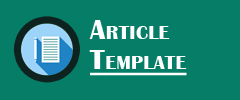Social Media-Based Political Campaign Strategies and the Impact of Filter Bubbles and Echo Chambers on the Electability of Presidential Candidates in the 2024 Election in Indonesia.
DOI:
https://doi.org/10.56806/jh.v6i3.288Keywords:
political campain , Bubble , echo chambers filter , electionAbstract
This research investigates how filter bubbles and echo chambers on Facebook and Instagram shape Indonesia's 2024 presidential election campaign. The research addresses the issue of social media algorithms amplifying selective exposure, which can deepen political polarization and limit voters' access to diverse viewpoints. This research aims to analyze campaign strategies in a digital environment, assess their influence on candidate electability among young voters, and examine the role of algorithms in shaping political information consumption. Using a qualitative approach, this research employs thematic content analysis on campaign posts, public comments, and screenshot data from Facebook profiles, supported by sentiment analysis. The results show that campaign teams strategically leveraged social media algorithms to customize messages, reinforce confirmation bias and amplify ideological divisions. Sentiment analysis of 100 online comments about the free lunch program showed that 39% were negative, 35.4% neutral, and only 25.6% positive, indicating prevalent skepticism. This research concludes that algorithm-based campaign strategies significantly impact messaging and voter perceptions, especially among digitally active youth, highlighting the need for more transparent algorithms and media literacy to support healthier democratic engagement.
Downloads
References
Herlita, I., & Fransiska, N. (2024). The role of social media in the dynamics of the 2024 presidential election campaign. Proceedings of Sasindo UNPAM National Seminar, 2(4), 65-72. Pamulang University.
Afrita, J. (2024). Election 2024: Reviewing the Impact of Social Media Campaigns on Political Participation. GEMA PUBLICA, 9(2), 83-95.
Dania, R., & Nisa, P. K. (2023). The role and influence of social media in the 2024 presidential election campaign. Virtu: Journal of Communication, Culture and Islamic Studies, 3(2).
Braun, V., & Clarke, V. (2006). Using thematic analysis in psychology. Qualitative Research in Psychology, 3(2), 77-101.
Tasen?e, T. (2025). Understanding filter bubble dynamics in social media communication: A literature review. Vivat Academia. Revista de Comunicación, 158, 1-22.
Ali, M., Sapiezynski, P., Korolova, A., Mislove, A., & Rieke, A. (2019). Ad delivery algorithms: The hidden arbiter of political messages. arXiv preprint arXiv:1912.04255. https://arxiv.org/abs/1912.04255
Fujiwara, T., Müller, K., & Schwarz, C. (2024). The influence of social media on elections: Evidence from the United States. Journal of the European Economic Association, 22(3), 1495-1539. https://doi.org/10.1093/jeea/jvad058
Ruhyat, R., & Wahidin, D. T. S. (2024). Analysis of Filter Bubble Algorithm on TikTok Related to 'Toxic' Polarization During the 2024 Presidential Election Campaign. Journal La Sociale, 5(5), 1326-1336. https://doi.org/10.37899/journal-la-sociale.v5i5.1334
Groshek, J., & Koc-Michalska, K. (2017). Helping populism win? Social media use, filter bubbles, and support for populist presidential candidates in the 2016 US election campaign. Information, Communication & Society, 20(9), 1389-1407. https://doi.org/10.1080/1369118X.2017.1329334
Jones-Jang, S. M., & Chung, M. (2024). Can we blame social media for polarization? Counter-evidence to filter bubble claims during the COVID-19 pandemic. New Media & Society, 26(6), 3370-3389. https://doi.org/10.1177/14614448221099591
Papakyriakopoulos, O., Tessono, C., Narayanan, A., & Kshirsagar, M. (2022). How algorithms shape the distribution of political advertising: A case study of Facebook, Google, and TikTok. Proceedings of the 2022 AAAI/ACM Conference on AI, Ethics, and Society (AIES'22), 1-15. https://doi.org/10.1145/3514094.3534166
Del Vicario, M., Vivaldo, G., Bessi, A., Zollo, F., Scala, A., Caldarelli, G., & Quattrociocchi, W. (2016). The echo chamber: Emotional contagion and group polarization on Facebook. arXiv. https://doi.org/10.48550/arXiv.1607.01032
Bozdag, E., & van den Hoven, J. (2015). Breaking the filter bubble: Democracy and design. Ethics and Information Technology, 17(4), 249-265. https://doi.org/10.1007/s10676-015-9380-y
Liu, P., Shivaram, K., Culotta, A., Shapiro, M. A., & Bilgic, M. (2021). Interaction between political typologies and filter bubbles in news recommendation algorithms. In Proceedings of the 2021 Web Conference (WWW '21) (pp. 3131-3141). ACM. https://doi.org/10.1145/3442381.3450113
Ruhyat, R., & Wahidin, D. T. S. (2024). Analysis of Filter Bubble Algorithm on TikTok Related to 'Toxic' Polarization During the 2024 Presidential Election Campaign. Journal La Sociale, 5(5), 1326-1336. https://doi.org/10.37899/journal-la-sociale.v5i5.1334
Daus, Z. (2024). Socializing politics: Rethinking filter bubbles and social media with Hannah Arendt. Ethics and Information Technology, 26(20). https://doi.org/10.1007/s10676-024-09759-5
Chueca Del Cerro, C. (2024). The power of social networks and social media filter bubbles in shaping polarization: An agent-based model. Applied Network Science, 9(69). https://doi.org/10.1007/s41109-024-00679-3
Ali, D. J., & Eriyanto. (2021). Political polarization and selectivity of social media users in Indonesia. Journal of Social and Political Sciences, 24(3), 268-283. https://doi.org/10.22146/jsp.58199
Bhatt, S., Joglekar, S., Bano, S., & Sastry, N. (2018). Illuminating the partisan website ecosystem. arXiv. https://doi.org/10.48550/arXiv.1803.03576
Bossetta, M. (2019). The digital architecture of social media: Comparing political campaigns on Facebook, Twitter, Instagram, and Snapchat in the 2016 United States general election. arXiv. https://doi.org/10.48550/arXiv.1904.07333
Downloads
Published
How to Cite
Issue
Section
License
Copyright (c) 2025 Danial Dengo Ate, Muhammad Ridwan, Samsul Ode

This work is licensed under a Creative Commons Attribution 4.0 International License.


























